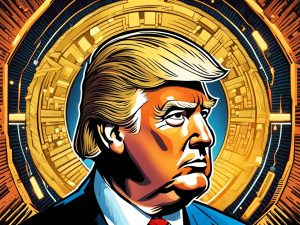Insights into South Korea’s Crypto Tax Landscape 📈
This year, South Korea’s political dynamics have significantly impacted the country’s approach to cryptocurrency regulations. The recent elections have ushered in a tense atmosphere marked by a divided legislative assembly, significantly shaping the future of crypto taxation policies. Both major political parties are vying for support from the younger populace by advocating for favorable changes around crypto taxation.
Current Political Climate and Crypto Influence 🏛️
The People’s Power Party (PPP) currently holds 108 seats in the National Assembly, while the opposition Democratic Party (DP) commands 134 seats. This distribution has led to a state of uncertainty known as a “lame duck” presidency, a term used to describe a period when the ruling party has diminished power and authority. Since the elections conducted in April this year, both parties have been strategizing their voter outreach programs, particularly aimed at the youth demographic.
Of particular interest is the role of cryptocurrency in this political jockeying. Both the DP and PPP have made promises to delay the initiation of crypto taxes, lower the taxation threshold, and explore new regulatory frameworks to foster a welcoming environment for traders and investors.
Legislative Developments Ahead 📝
As reported, the Democratic Party intends to present its proposal to the Tax Subcommittee under the National Assembly’s Strategy and Finance Committee by November 25. Securing approval for this proposal could set the stage for an influential debate during the plenary session scheduled for November 26. Their objective is clear – they aim to fast-track the bill before the conclusion of the current parliamentary session.
With both parties leaning towards revising existing investment tax codes, there is a belief that progress could materialize quickly. Recent hints from the leadership of the PPP reveal a similar inclination to postpone crypto tax regulations, aligning further with the DP’s objectives.
Ongoing Discussions About Crypto Taxation 💬
The topic of cryptocurrency taxation in South Korea has been a contentious issue since 2019. Lawmakers voted to implement a tax on digital assets back in 2020, with initial plans to put the law into effect on January 1, 2022. However, due to political maneuvering, there have been multiple delays, reflecting the changing sentiments within the National Assembly.
As discussions surrounding the potential for tax postponement continue throughout this year, several proposals have surfaced. These initiatives propose a more accommodating tax structure and aim to consider the interests of both traders and casual investors. The government’s shifting stance indicates a stronger focus on balancing regulation and encouraging innovation in the crypto space.
Political Pledges and Future Considerations 🗳️
The manifestos of both the DP and the PPP emphasize their commitment to revisiting crypto tax regulations. A representative from the DP indicated that the proposed changes would likely exempt most small-scale investors from tax obligations, further enticing young voters who are stepping into crypto trading.
The DP intends to negotiate with the PPP to create a seamless regulatory environment, although it remains prepared to abandon its bill should the government express non-support for these initiatives. The PPP’s leadership has suggested that a delay in the activation of crypto taxes is preferable to altering the proposed thresholds for taxation, showing a possible willingness to collaborate for mutual benefits.
Hot Take: Navigating the Future of Crypto in Korea 🌟
The evolving landscape of cryptocurrency taxation in South Korea remains fraught with complexity. This year has showcased the intricate interplay between political will and investor confidence. While both parties align on the need for favorable crypto regulations, the actual execution and legislative efficacy remain in question. The potential for a more balanced approach to crypto taxation could not only impact local traders and investors but also set a precedent for other nations grappling with similar challenges in the digital asset domain.
As South Korea navigates its legislative processes, the decisions made within the National Assembly could usher in a period of innovation and growth or further regulatory complexities in the world of cryptocurrencies.





 By
By
 By
By
 By
By
 By
By
 By
By